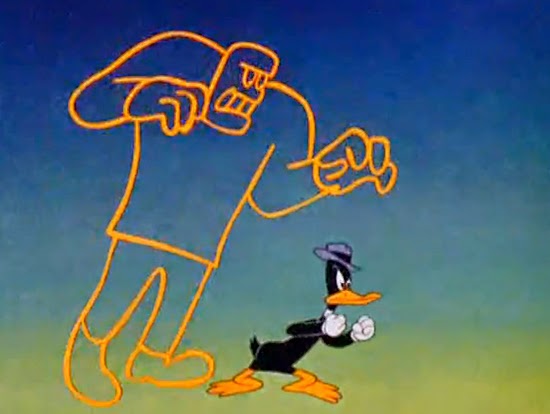 Descriptively named “Neon Noodle”, this unusual Frankenstein
Monster is beautifully animated, casting a soft neon glow, switching from blue
to orange and yellow. In a surrealistic scene, Daffy dispatches Neon Noodle by
snapping and twisting him into an “Eat at Joe’s” neon sign. All the other
bizarre bad guys are tommy gunned in a gloriously gratuitous scene deemed so
violent that it was cut when the cartoon played on TV. A restored version would
be the very first short shown when The Cartoon Network launched in 1992. Among
the film’s admirers is John Kricfaluzi, creator of Ren and Stimpy, who said, “I saw this thing and it completely
changed my life.”
Descriptively named “Neon Noodle”, this unusual Frankenstein
Monster is beautifully animated, casting a soft neon glow, switching from blue
to orange and yellow. In a surrealistic scene, Daffy dispatches Neon Noodle by
snapping and twisting him into an “Eat at Joe’s” neon sign. All the other
bizarre bad guys are tommy gunned in a gloriously gratuitous scene deemed so
violent that it was cut when the cartoon played on TV. A restored version would
be the very first short shown when The Cartoon Network launched in 1992. Among
the film’s admirers is John Kricfaluzi, creator of Ren and Stimpy, who said, “I saw this thing and it completely
changed my life.” February 4, 2015
The Great Piggy Bank Robbery (1946)
The Monster had a name, and it was… Neon Noodle!
Here’s another cartoon cameo, and certainly one of the most
original representations of The Monster ever, in what is considered one of the
all-time best animated shorts ever made.
Directed for Warner Brothers by Bob Clampett in his
trademark unbridled, madcap style, THE GREAT PIGGY BANK ROBBERY (1946) is
essentially a takeoff on Chester Gould’s Dick Tracy comic strip and its gallery of weird criminals.
Here, Daffy Duck imagines himself as “Duck Twacy” going up against an even
weirder and way wackier set of gangsters with names and attendant physical
configurations as Snake Eyes, Pickle Puss, 88 Teeth, a Wolfman and, among
others, a highly stylized Frankenstein Monster made of neon. “Frankenstein” isn’t name
checked, but the character is instantly recognizable with his giant size, flat
head and outstretched arms.
 Descriptively named “Neon Noodle”, this unusual Frankenstein
Monster is beautifully animated, casting a soft neon glow, switching from blue
to orange and yellow. In a surrealistic scene, Daffy dispatches Neon Noodle by
snapping and twisting him into an “Eat at Joe’s” neon sign. All the other
bizarre bad guys are tommy gunned in a gloriously gratuitous scene deemed so
violent that it was cut when the cartoon played on TV. A restored version would
be the very first short shown when The Cartoon Network launched in 1992. Among
the film’s admirers is John Kricfaluzi, creator of Ren and Stimpy, who said, “I saw this thing and it completely
changed my life.”
Descriptively named “Neon Noodle”, this unusual Frankenstein
Monster is beautifully animated, casting a soft neon glow, switching from blue
to orange and yellow. In a surrealistic scene, Daffy dispatches Neon Noodle by
snapping and twisting him into an “Eat at Joe’s” neon sign. All the other
bizarre bad guys are tommy gunned in a gloriously gratuitous scene deemed so
violent that it was cut when the cartoon played on TV. A restored version would
be the very first short shown when The Cartoon Network launched in 1992. Among
the film’s admirers is John Kricfaluzi, creator of Ren and Stimpy, who said, “I saw this thing and it completely
changed my life.”
THE GREAT PIGGY BANK ROBBERY was Clampett’s next to last job
at Warner’s. As soon as he left, and continuing on up to his death in 1984,
controversy would follow after he claimed sole credit for creating classic
characters such as Bugs Bunny and Porky Pig, while evidence shows the
characters has evolved under a who’s who of animators. Director Chuck Jones and
voice actor Mel Blanc never forgave him. Still, Clampett’s genius, his enduring
influence and his pioneering contributions to animation remain obvious and
rightfully celebrated. He would go on to a successful career in the nascent field
of television, creating the Time for Beanie puppet show in 1949, eventually animated as Beanie and Cecil.
Related:
•
06:30
![]()
Subscribe to:
Post Comments (Atom)

.jpg)




1 comment:
It's a brilliant one, Pierre! I've loved it since UHF childhood, both as a Termite Terrace fan, and as a Chet Gould fan.
-Craig
Post a Comment